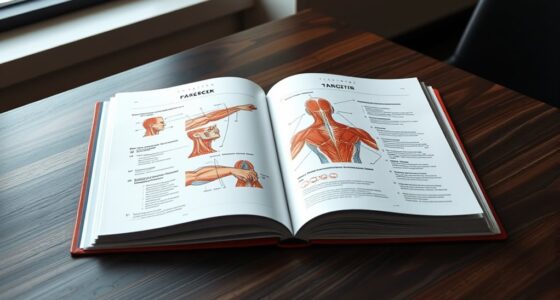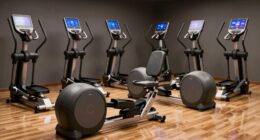After your workout, focus on proper nutrition and hydration to support muscle repair and replenish lost minerals with protein-rich foods, smoothies, and plenty of water. Don’t skip gentle movement and stretching, as staying active helps prevent stiffness, improve flexibility, and boost blood flow for faster recovery. Incorporating mindfulness practices can also reduce stress, aiding healing. Keep these tips in mind if you want to optimize your recovery—there’s more to explore on how to do it right.
Key Takeaways
- Prioritize consuming protein and hydration immediately after exercise to support muscle repair and replenish fluids.
- Replenish electrolytes with sports drinks or balanced meals to prevent cramps and dehydration.
- Incorporate gentle movement, stretching, and foam rolling to reduce stiffness and promote blood flow.
- Practice deep breathing and flexibility exercises to relax muscles and enhance recovery.
- Avoid skipping mindfulness or stress-reduction techniques to strengthen immune function and overall healing.
Do Prioritize Proper Nutrition and Hydration

After your workout, prioritizing proper nutrition and hydration is essential for ideal recovery. You need to focus on adequate protein intake to repair and build muscles effectively. Consuming protein-rich foods or shakes within an hour helps jump-start the recovery process. Equally important is maintaining electrolyte balance, which prevents dehydration and muscle cramps. Replenish lost minerals like sodium, potassium, and magnesium through sports drinks or balanced meals. Don’t overlook hydration—drink enough water to restore fluids lost through sweating. Proper nutrition and hydration support your immune system, reduce soreness, and prepare you for your next workout. Additionally, incorporating mindfulness practices can help manage stress levels that may interfere with recovery. By paying attention to these post-exercise essentials, you’ll optimize recovery and enhance overall performance, setting a solid foundation for your fitness journey.
Not Skip Gentle Movement and Stretching

Incorporating gentle movement and stretching into your post-workout routine helps prevent stiffness and promotes blood flow to your muscles. It’s essential to cool down properly. Here are four effective ways to do so:
- Use foam rolling on tight muscles to release tension and improve flexibility.
- Perform yoga stretches like downward dog or hamstring stretches to gently lengthen muscles.
- Include light walking or slow cycling to keep blood flowing without overexerting.
- Focus on deep breathing exercises to relax your nervous system and facilitate recovery.
Engaging in these recovery techniques can also help reduce the risk of injury by maintaining proper muscle flexibility.
Avoid skipping this step, as it reduces soreness and accelerates healing. Gentle movement and stretching ensure your muscles recover efficiently and stay flexible, making your next workout smoother.
Frequently Asked Questions
How Soon After Exercise Should I Eat or Hydrate?
You should eat and hydrate as soon as possible after your workout, ideally within 30 to 60 minutes. This timing maximizes nutrition timing benefits, replenishing glycogen stores and aiding muscle repair. Use effective hydration strategies by drinking water or electrolyte-rich beverages immediately post-exercise. Staying ahead with proper nutrition and hydration helps your body recover faster, reduces soreness, and prepares you for your next workout.
Are Specific Foods Better for Recovery Than Others?
Certain foods are better for recovery because they provide key nutrients at the right time. Focus on nutrient timing by choosing carbs and protein-rich options like lean meats, dairy, or whole grains soon after your workout. Supplement choices like protein shakes or amino acids can boost recovery as well. Avoid processed snacks high in sugar and unhealthy fats. Prioritize wholesome, nutrient-dense foods to help your muscles rebuild and reduce fatigue.
Can Stretching Reduce Muscle Soreness Effectively?
Imagine your muscles as tightly wound springs, and stretching as gentle hands easing their tension. Yes, stretching can help reduce muscle soreness by promoting muscle relaxation and increasing blood flow. While it may not eliminate soreness entirely, regular stretching after workouts aids soreness prevention, making your muscles more flexible and resilient. Incorporate gentle stretches into your routine to support recovery and keep those springs loose and ready for your next challenge.
How Much Water Should I Drink Post-Workout?
You should aim to drink about 16-24 ounces of water within 30 minutes of finishing your workout. Proper hydration timing helps replenish lost fluids and supports recovery. Additionally, pair your water intake with food timing—consume a balanced meal or snack within an hour to restore electrolytes and nutrients. Staying consistent with hydration and food timing maximizes recovery, reduces soreness, and keeps your energy levels steady.
Is It Okay to Skip Stretching if I Feel Tired?
Skipping stretching when you’re tired is like closing the gate before the storm passes; it might seem easier now, but it risks injury later. Mental fatigue can cloud your judgment, but neglecting gentle stretches hampers injury prevention and prolongs recovery. Instead, listen to your body, breathe deeply, and do light stretches. This keeps your muscles limber and shields you from setbacks, even when exhaustion weighs heavily on your mind.
Conclusion
Think of your post-workout routine as tending to a delicate garden. Prioritize proper nutrition and hydration to nourish your body, while gentle stretching and movement help loosen tight muscles like tender stems. Skipping these steps is like neglecting your plants—they’ll struggle to thrive. By giving your body the right care, you’ll nurture a strong, resilient foundation that blooms with improved strength and recovery. Treat your body well, and it’ll reward you with lasting energy.









